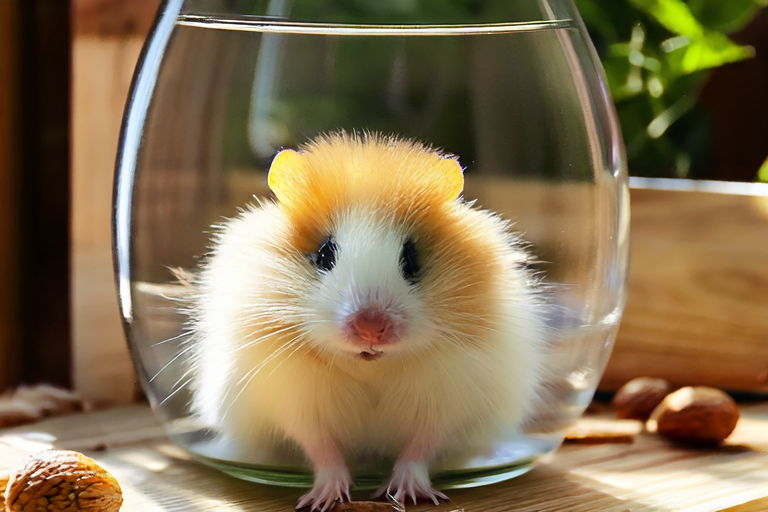Golden Hamsters: The Ultimate Guide for New Owners
Welcome to the wonderful world of golden hamsters! These cute, furry creatures are popular pets for families and individuals alike. This guide will provide you with everything you need to know about caring for your golden hamster, from housing and diet to health care and exercise needs.
Housing
First things first – your golden hamster needs a comfortable home. A wire cage is ideal, but ensure that the spacing between wires does not allow your hamster to squeeze through. For bedding, opt for aspen wood shavings or paper-based bedding, avoiding pine or cedar which can be harmful due to their aromatic oils. Provide your hamster with nesting material like tissue paper or commercially available nest boxes. Ensure there’s enough space for your hamster to run around and explore.
Place the cage in a quiet area away from direct sunlight and drafts. Keep the temperature moderate, ideally between 65-75°F (18-24°C). Clean the cage weekly, replacing soiled bedding and scrubbing food and water bowls. This helps maintain good hygiene and prevents the spread of diseases.
Potential pitfalls: Avoid overcrowding the cage with too many toys or accessories, as this can limit your hamster’s movement. Also, keep the cage away from areas with frequent disturbances, such as near televisions or busy hallways.
Diet
A balanced diet is crucial for your golden hamster’s health. Their diet should consist primarily of commercial hamster mix, which contains seeds, grains, and pellets designed specifically for hamsters. Supplement this with fresh vegetables and fruits, like carrots, broccoli, and apple slices, but offer these in moderation as they can cause digestive issues if overfed. Fresh water should always be available in a sipper bottle.
Be cautious with certain foods that can be harmful, such as chocolate, caffeine, citrus fruits, and avocado. These items can cause serious health problems for your hamster.
Tips: Rotate the types of fresh vegetables and fruits you give your hamster to prevent boredom and ensure a varied diet. Always introduce new foods gradually to monitor for any adverse reactions.
Health Care
Your golden hamster requires regular veterinary check-ups. Find a vet who specializes in exotic pets or small animals. Common health issues include dental problems, respiratory infections, and obesity. Monitor your hamster’s weight, coat condition, and behavior regularly. Early signs of illness may include lethargy, loss of appetite, or changes in bathroom habits.
Vaccinations are generally not required for hamsters, but they can be prone to certain parasites and bacterial infections. Consult your veterinarian for advice on preventive measures.
Potential pitfalls: Do not self-diagnose or treat your hamster without consulting a professional. Some symptoms can be misleading, and improper treatment can worsen the condition.
Exercise Needs
Golden hamsters are naturally active and need opportunities to exercise. In addition to the cage, provide a safe exercise wheel. Choose one with a solid surface to prevent injuries. Rotate toys and tunnels periodically to stimulate your hamster’s curiosity and prevent boredom.
Handle your hamster gently and frequently to get it used to human interaction. This can also serve as mild exercise for your pet.
Tips: Observe your hamster’s activity levels and adjust its environment accordingly. If your hamster seems less active than usual, consult a veterinarian.
Grooming
Golden hamsters are self-groomers, so regular brushing is usually unnecessary. However, you may need to assist with bathing occasionally. Use a damp cloth to gently wipe your hamster, focusing on areas where it cannot clean itself, such as the ears and paws. Never submerge your hamster in water, as it can lead to hypothermia.
Trimming nails is essential, especially if your hamster spends much time on hard surfaces. Use a pair of nail clippers designed for small animals. Be careful not to cut the quick, the blood vessel inside the nail, which can cause bleeding and pain.
Potential pitfalls: Avoid over-bathing your hamster, as it can strip natural oils from its fur and cause skin irritation.
Common Behaviors
Golden hamsters are nocturnal, meaning they are most active at night. They may appear sleepy during the day but will become more energetic when lights go out. Understand their sleep patterns to avoid disturbing them.
Your hamster may hoard food, creating small piles in various parts of the cage. This is a natural behavior, but ensure that the food remains fresh and uncontaminated.
Hamsters can be territorial, especially when introduced to new environments or other animals. Always supervise interactions and provide separate living spaces if necessary.
Tips: Respect your hamster’s sleep schedule and avoid handling it when it’s likely to be resting. Providing multiple hiding spots and tunnels can help reduce territorial behavior.
Bonding Tips
Bonding with your golden hamster takes time and patience. Start by letting your hamster become familiar with your scent. Place a towel in your lap while watching television or reading, allowing your hamster to sniff and investigate.
Gradually introduce gentle handling. Sit on the floor or a low table where your hamster feels secure. Offer treats to encourage positive associations. Over time, your hamster will become more comfortable with your presence.
Potential pitfalls: Avoid forcing interactions or handling your hamster roughly. This can lead to stress and fear, making bonding more difficult.
Tips: Spend quality time with your hamster every day. Consistency is key in building trust and a strong bond.
Resources for Further Learning
To deepen your understanding of golden hamsters, consider joining local or online hamster enthusiast groups. Websites, forums, and social media platforms dedicated to small pets often offer valuable insights and support. Books on hamster care and behavior can also be helpful.
Remember, owning a pet is a commitment. Take the time to learn as much as you can about golden hamsters before bringing one into your home. With proper care and attention, your golden hamster can be a delightful companion for years to come.
